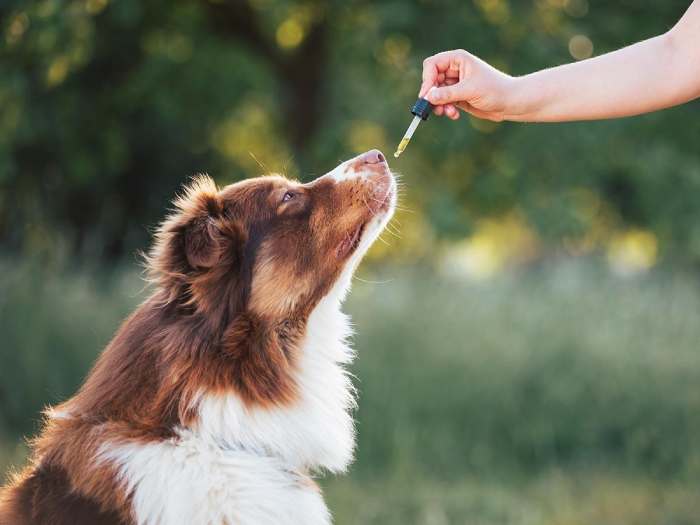Did you know that tea tree oil is one of the most popular essential oils used to treat dogs? Its natural antifungal, antiseptic, and antibacterial properties make it a great choice for treating a variety of skin irritations.
But is tea tree oil safe for your pup? This article will explore the benefits and risks of using tea tree oil on your dog, as well as common uses, alternative treatments, and safety guidelines.
Benefits of Tea Tree Oil: Recognizing the Positive Aspects in Certain Contexts
You may be surprised to learn that tea tree oil can benefit your dog. This essential oil has antifungal, antiviral, and antibacterial properties that can help to promote healthy skin and fur.
It can also help to treat skin infections, allergic reactions, and skin irritation. In addition, tea tree oil can help repel fleas and ticks and can even be used to prevent fungal infections.

A few drops of tea tree oil mixed with a carrier oil can be applied directly to your dog’s skin or fur. As with all essential oils, be sure to dilute it before applying it to your pet, as tea tree oil can be toxic to dogs when used in large amounts.
Risks of Tea Tree Oil: Examining Potential Dangers and Adverse Effects for Dogs
Despite its many benefits, using tea tree oil on your dog can pose some risks if not done correctly:
- High levels of toxicity can occur if ingested.
- Overuse can cause skin irritation and inflammation.
- Concentrated products can cause health issues.
- Poor-quality products can result in adverse reactions.
Tea tree oil has a wide range of healing properties, but it’s also important to be aware of the potential risks of using it on your pet. It’s important to be aware of the toxicity levels of the product, as a small amount ingested can cause serious health issues. Additionally, overusing the oil can lead to skin irritation and inflammation. It’s also important to be aware of the quality of the product, as poor-quality products can cause adverse reactions.
Always consult with your veterinarian before using tea tree oil on your pet.
Common Uses: Understanding Where and How Tea Tree Oil is Utilized in Canine Care
Now that you know the risks associated with using tea tree oil on your pet, it’s important to understand how it can be used.
Tea tree oil is often used to help reduce odor and to treat skin conditions, such as flea infestations, dry skin, and hot spots. It’s also used to help treat ear infections, fungal infections, and even mange.

It can help control odor and relieve discomfort when used on the skin. Also, it can be used to clean wounds and help fight off infection. It can help reduce inflammation and relieve discomfort when used in the ears.
Finally, it can also help promote healthy skin and coat. When used properly, tea tree oil can be a safe and effective way to help maintain your pet’s health.
Alternative Treatments: Exploring Safer Options for Specific Conditions
Frequently, pet owners look to alternatives when it comes to treating their dog’s skin and coat issues and other ailments. Natural remedies and holistic approaches can be beneficial, and one commonly used treatment is tea tree oil. But is tea tree oil safe for dogs?
It’s important to note that tea tree oil should always be diluted before it’s used on your pet. Intended for topical use, tea tree oil can be used to treat yeast and bacterial infections, fleas, ticks, and other skin issues. It can also be used to reduce inflammation and to promote healing.
However, tea tree oil is toxic in large doses, so it’s important to be mindful of how much you use. Here are some tips to keep in mind when using tea tree oil on your pet:
- Always dilute the oil in a carrier oil such as coconut oil, olive oil, or almond oil
- Follow the instructions on the product label
- Don’t use tea tree oil on open wounds
- If your dog shows signs of an adverse reaction, seek immediate veterinary care
Safety Guidelines: Implementing Cautionary Measures When Considering Tea Tree Oil for Dogs
Since tea tree oil can be toxic in large doses, adhering to some safety guidelines when using it on your dog is important. Before using tea tree oil on your pup, it’s important to check with your veterinarian to ensure your dog’s skin issues or allergies won’t be further aggravated.
If the vet gives the go-ahead, you should use only high-quality, 100% pure tea tree oil to ensure the best results. When applying tea tree oil, diluting it with a carrier oil like olive or coconut oil is essential. Generally speaking, you should use no more than a 3-5% concentration of tea tree oil in the carrier oil.
Also, when applying it to your pup, always use a cotton ball or gauze pad, and never pour the oil directly onto the skin. Finally, monitor your dog for any signs of an allergic reaction and discontinue using tea tree oil if one occurs.
Frequently Asked Questions:
Yes, tea tree oil may treat fleas on dogs as a natural alternative. However, be aware of allergic reactions your dog may have. Exercise caution when using this method.
Yes, tea tree oil can be harmful if ingested by a dog. In some cases, it can cause skin reactions or even dog allergies. So, be careful not to let your beloved pooch consume it – ironically, it’s not as beneficial as it may seem!
When using tea tree oil on your dog, follow the safe dosage to avoid potential risks. Be mindful of any long-term effects that may occur.
Yes, tea tree oil can treat other skin conditions in dogs. For example, one study showed that a natural remedy of tea tree oil effectively treated skin allergies in a dog. It is important to be mindful of dosage when using tea tree oil as a treatment for any skin condition in dogs, as it can be toxic.
It is important to consider that some dog breeds may be more sensitive to the topical application of tea tree oil due to potential allergies. Therefore, it is wise to consult with your veterinarian first if you are considering using tea tree oil to treat skin conditions in your dog.
Conclusion:
In conclusion, while tea tree oil offers various benefits for treating dogs’ skin issues and promoting overall health, it comes with potential risks, such as toxicity and skin irritation.
Dilution and adherence to safety guidelines are crucial to ensure its safe usage. Consulting with a veterinarian before incorporating tea tree oil into your dog’s care routine is essential to prevent adverse reactions.
As with any pet care practice, prioritizing your dog’s well-being and seeking professional guidance ensures a balanced approach to holistic treatments.

Hey there, I’m Janet Brooks, a dog-loving student from California. I’m all about helping pups in need, especially those without homes. Me and my awesome friends work together to give shelter and love to stray dogs. Oh, and I also write blogs about dogs to share helpful info.